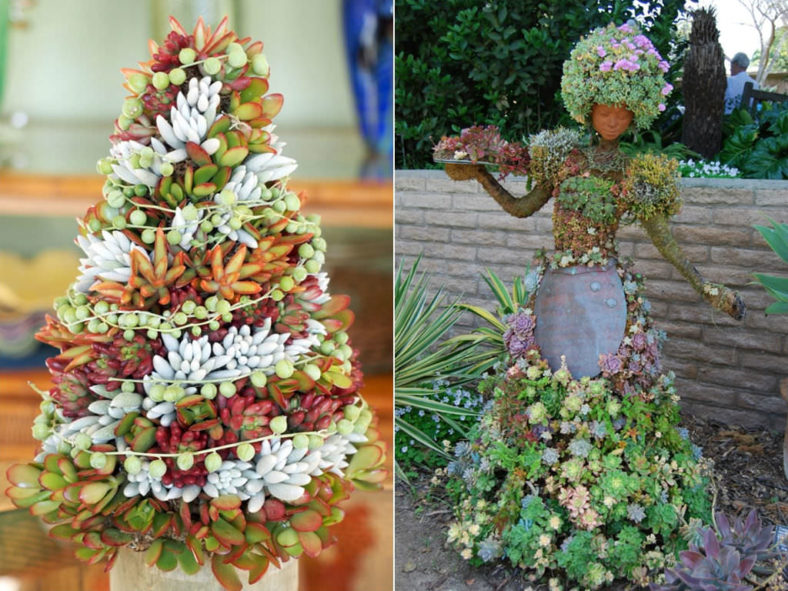One of the oldest forms of sculpture, topiary art, involves the meticulous pruning and shaping of plants to create three-dimensional masterpieces over time. Creating your own topiaries at home may be easier than you think.
Succulents are a great starter plant for a project like this. They are easy to propagate, need little care, and most have compact growth habits that work well to keep a tight form. Creating a DIY succulent topiary is easy, provided you follow these steps for preparation and planting.
1. Collecting Plants
Succulents are great plants for your first topiary creation. Try to collect or purchase plants that are compact in form so that they maintain the desired shape of your object rather than growing tall and distorting the form. You can collect cuttings from a generous friend or purchase cuttings directly from a supplier. If you buy potted plants, clip off the stems for topiary but keep the pots; most will regrow quickly into a whole plant. As you prepare your cuttings, remove the lower leaves from approximately 1 inch (2.5 cm) of the stem. This will be the part that goes in the frame. It will help to collect the plants a few days before planting your topiary so these new wounds can callous over.
2. Choosing a Frame
The key qualities desired in a frame are sturdiness and ample space for planting cuttings. If your topiary is going to stand on its own, it will need a heavy or broad base to support the weight of the plants and the planting media. Shapes can range from a very formal sphere to a decorative type of wire chicken or a simple cone for a tree topiary. Visiting your local hobby store will give you various ideas and possibilities.

3. Prepping Your Topiary Frame
Your supplies for this process will be very simple: long-fibered sphagnum moss or a mixture of the moss and potting soil, monofilament (fishing line), gloves, and perhaps a light floral wire. Sphagnum moss works very well for topiaries because it holds water well, is easy to compact, and at the same time, will also expand to help keep cuttings and small plants in place until they root.
Soak the sphagnum moss in a bucket of water until it is fully saturated. Wear gloves when handling the sphagnum moss to fill your frame. If the spaces in your form are too wide to keep the moss in, use a light floral wire to create a netting that will help keep the moss firm. You will be packing the form very tightly, and having a strong form to push against will be helpful. As you add small amounts of sphagnum at a time, continue to press it in so that the form ends up almost hard to the touch. If you can push your finger in and make an indent, you definitely need to pack it tighter.
Do not worry about extra pieces of moss hanging out or an untidy look, as this next and final step of preparation will make it look like a store-bought topiary. You will use your fishing line to tightly wrap the frame over and over until all of the small pieces are pulled in. The fishing line will not be visible in the final product, so ensure that you wrap the frame very liberally.
4. Planting
This is the rewarding part of the process. Planting your cuttings in the prepared frame is as simple as using a pen or pencil to make a hole in the sphagnum moss. The moss should be tough to poke the pen into, so move quickly to push your succulent stem into this opening after the pen is removed. The opening will stay visible for a few seconds before the moss tightens around the stem and holds it in place.
Work with your largest cuttings first and then finish with the smaller ones. Using an assortment of different plants will add color and texture to your topiary, while a more formal look can be achieved by using a single variety for the entire frame. Your succulents should be rooted in two to three weeks. Keep the frame in a bright area and resist the temptation to water often. As the sphagnum moss starts to dry out, it will turn lighter in color, indicating that it is time to water the form.
5. Topiary Care
Your succulent topiary will grow, and spaces will fill in over the next few months. Most topiary forms featuring succulents require watering once a week. For best results, shower your frame with water for several minutes until the moss is fully saturated. A light application of water-soluble fertilizer every other month will keep your plants healthy. If your topiary starts to look a little "unruly" as plants begin to grow, take a pair of pruners and cut back any long plants. These will soon regrow, and the pieces you cut off can fill in gaps or serve as the start of your next project.
Source: misssmartyplants.com
Links
- Succupedia: Browse succulents by Scientific Name, Common Name, Genus, Family, USDA Hardiness Zone, Origin, or cacti by Genus